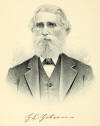Biography - George Gibson
 GEORGE E. GIBSON was burn in Wilson County, Tenn., in 1824, and is a son
of Archibald Gibson, of North Carolina, who settled in Tennessee about 1814,
and followed farming for a living. Archibald Gibson was married twice, and
by his second wife, who was Frances Moseley, nee Eddings, a daughter of
William Eddings, of Tennessee, he had one son, George E., and two daughters.
Archibald Gibson was a prosperous farmer and lived and died on his own farm.
]Mrs. Gibson died about 1835, aged sixty years, Mr. Gibson lived until 1855,
and died in his ninety-second year.
GEORGE E. GIBSON was burn in Wilson County, Tenn., in 1824, and is a son
of Archibald Gibson, of North Carolina, who settled in Tennessee about 1814,
and followed farming for a living. Archibald Gibson was married twice, and
by his second wife, who was Frances Moseley, nee Eddings, a daughter of
William Eddings, of Tennessee, he had one son, George E., and two daughters.
Archibald Gibson was a prosperous farmer and lived and died on his own farm.
]Mrs. Gibson died about 1835, aged sixty years, Mr. Gibson lived until 1855,
and died in his ninety-second year.
George E. Gibson left the parental roof when thirteen years old in company with his half-brother, Joseph Gibson, and went to Missouri. From that time until he was twenty years old, he was of a roving disposition, and was in thirteen different States, Southern and Western, but was in none north of Missouri. He worked on a farm for from $6 to $8 per month, and afterward was engaged with stockmen most of the time. He helped to drive a large drove of sheep from Tennessee to Alabama, near Mobile, occupying two months on the way, and for some time after he was fifteen years old he followed rafting on the Mississippi River. He then became an overseer of slaves on a Tennessee plantation, receiving as high as $25 per month as wages.
In May, 1850, Mr. Gibson married Miss Martha Ann Barber, of Rutherford County, Tenn., daughter of Thomas and Mary (Leath) Barber. He was engaged in merchandising in Wilson County, Tenn., for two 3-ears and then removed to Calloway County, Ky., where he bought a farm of one hundred acres of improved land. On this farm he resided eleven years, selling out in 1862 and removing to his present home in Johnson County. The removal was made by means of horse teams and wagons, and he brought his wife and five children. They had buried one little daughter of three years in Kentucky. When Mr. Gibson made this removal he had some means — a family mare, a good team of mules and $800 in money. He was well situated in Kentucky and well satisfied there, but like many others who were loyal to the Government of the United States, it was necessary for him to leave Kentucky in order that he might enjoy his own opinions and practice his principles in peace. Upon arriving in Illinois he bought a farm of one hundred and sixty acres of land for $1,550, going in debt to the extent of $750; but by selling his mule team and a good crop of wheat which was growing when he bought the farm, he soon paid off the debt. Since then he has bought several farms and deeded them to his sons. The most land he ever owned at one time was three hundred acres, and he now owns two hundred acres of good land, which is under a high state of cultivation, and worth at least $4,000. The farm is, however, not for sale, as Mr. Gibson traveled all he desired when young. His Kentucky farm was about three miles from the Tennessee line, and was between the two belligerent armies, and he could not move until after the capture of Ft. Donelson. He might retire at night with a corn crib and smoke house full of corn and meat, but in the morning they would both be empty. Such reasons as these, as well as the other reasons given, determined him in sacrificing his property, and in coming to the free air and soil of Illinois.
When Mr. Gibson married his first wife she was sixteen years old. She bore him seven children and died in 1866, at the age of thirty-three. Mr. Gibson lived a widower seventeen years, and in 1883 married Mrs. H. M. Ridenhower, nee Lovina Miller, of North Carolina. He has buried one little daughter since coming to Illinois, Martha A., who died at the age of two years. The children now living are as follows: John T.; Frances, wife of W. P. Mohler, a farmer of Vienna, and who has two sons and six daughters; Louisiana, wife of Allen Miller, a farmer of Williamson County, and who has two daughters; William Allen, a single man at home; and James A., a farmer near by, who has a wife and one son and one daughter. James A. was married March 21, 1886, to Miss Fleta Ridenhower, and their children are George Raymond, aged five years, and De Bernice. Mr. Gibson is a member of the Cumberland Presbyterian Church, and Mrs. Gibson is a member of the Methodist Episcopal Church.
Mr. Gibson expresses a realizing sense of the mercy and goodness of God, shown in keeping him in all his wanderings through youth and maturer years free from all kinds of wickedness, in giving him two good companions and good and dutiful children, and in assisting him in the accumulation of a plentiful share of this world's goods. He considers that his mother's advice while on her death-bed, and especially her pure life, have been the guiding stars of his life, keeping him free from all the vices of youth, such as drinking, cursing, gambling and the social evil, and for all of this good fortune he feels devoutly thankful to the mercy and guiding care of a Being who is All-wise and All-good.
Extracted 17 Apr 2016 from 1893 Biographical Review of Johnson, Massac, Pope, and Hardin Counties, Illinois, pages 167-168.



